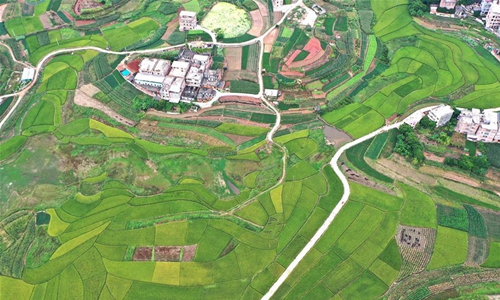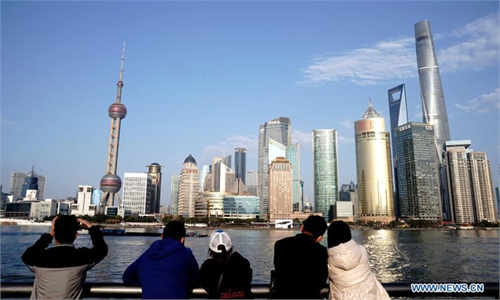China vows to accelerate rural migrants integration into cities as new urbanization efforts

Aerial photo taken on Oct. 16, 2020 shows a rural landscape of Pumiao Township, Yongning District, Nanning, south China's Guangxi Zhuang Autonomous Region. (Xinhua/Zhou Hua)
There are still more than 200 million rural migrants who have not settled in cities, and some of those who have already settled still have the problem of low quality of urbanization. Promoting the urbanization of rural migrants is still the primary task of new urbanization, an official at China's top economic planner said on Monday.
To date, China's new-type urbanization construction has made major historic achievements. Rural migrants have accelerated its integration into the city, and the permanent urban residents exceeded 60 percent of the Chinese population, Hu Zucai, deputy director of the National Development and Reform Commission (NDRC) said a press conference held in Beijing on Monday.
Hu outlined the goal of allowing100 million rural migrants and other permanent residents settled - which meant to get a hukou in urban areas, has also been successfully achieved.
The country unveiled in 2014 guidelines on the hukou reform, setting a goal to help around 100 million people to obtain hukou in towns and cities by 2020. The hukou reform has put forward a unified residence registration, ending a system that had divided the nation into rural and non-rural populations since the 1950s.
The NDRC official vows to accelerate the pace of urbanization in the next phase in three aspects, including deepen the reform of the household registration system, optimize the layout of urbanization and promote the coordinated development of large, medium and small cities and to improve the living quality of the city.
Hu also vows to further relax restrictions for rural dwellers to get household registration status in cities other than some mega-cities, noting that cities with a permanent population of less than 3 million in urban areas must completely scrap the hukou restrictions.
In super-large cities with a permanent population of more than 5 million, it is necessary to improve the current settlement policy, Hu said.
Established in the 1950s, the hukou system used to classify China's population into rural and non-rural categories, to control the movement of people between those areas. Household registration is tied to one's place of residence and used to obtain access to basic welfare and public services, according to a report from the Xinhua News Agency.
Hu also noted that the country will further promote equal access to basic urban public services for all permanent population, and achieve "equal treatment and everything" in towns and cities.


